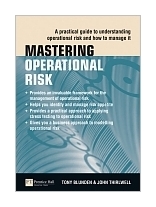|
||
• wydawnictwa polskie
• Zamów informacje o nowościach z wybranego tematu • kontakt
• Cookies na stronie |
MASTERING OPERATIONAL RISK: A PRACTICAL GUIDE TO UNDERSTANDINGBLUNDEN T. THIRLWELL J. / OPERATIONAL RISK AND TO MANAGE ITwydawnictwo: PEARSON ED FT/PH , rok wydania 2010, wydanie Icena netto: Operational risk is a constant concern for all businesses. It goes far beyond operations and process to encompass all aspects of business risk, including strategic and reputational risks. Within financial services, it became codified by the Basel Committee on Banking Supervision in the 1990s. It is something that needs to be taken seriously by all those involved in running, managing and leading companies. Mastering Operational Risk is a comprehensive guide which takes you from the basic elements of operational risk, through to its advanced applications. Focusing on practical aspects, the book gives you everything you need to help you understand what operational risk is, how it affects you and your business and provides a framework for managing it. Mastering Operational Risk:
Operational risk arises in all businesses. It is a broad term and can relate to internal processes, people, and systems, as well as external events. All listed companies, charities and the public sector must make risk judgements and assessments and company managers have an increasing responsibility to ensure that these assessments are robust and that risk management is at the heart of their organisations. In this practical guide, Tony Blunden and John Thirlwell, recognised experts in risk management, show you how to manage operational risk and show why operational risk management really will add benefits to your business. Mastering Operational Risk includes:
John Thirlwell is non-executive director at Chase Cooper, a risk
management solutions company that focuses on the financial sector to provide solutions for
enterprise risk, operational risk, Sarbanes-Oxley, credit and market risk. He’s worked
on the following books: co-author, Operational Risk Handbook (2001-4) (Securities
Institute); A Guide to Business Continuity Management (2001) (BBA/KPMG); Chapters in
Advanced Operational Risk (2002) and Basel Handbook (2003)(Risk Waters). Tony Blunden is an Executive Director of Chase Cooper Ltd and heads its consultancy division. Both Tony and John are regular and sought-after speakers on the operational risk conference circuit. Tony’s book publications include: Co-author, Risk-Based Compliance (2001) (Butterworths); The Euromoney Derivatives and Risk Management Handbook 2001/02 (2001); Operational Risk: Regulation, Analysis and Management (2002) (FT Prentice Hall) and Managing Business Risk (2003) Kogan Page Limited. Table of Contents
Part 1 Setting the scene Chapter 1 - What is operational risk? Chapter 2 - The busineess case for operational risk management Part 2 - The Framework Chapter 3 - Governance Chapter 4 - Risk and control assessment Chapter 5 - Events and losses Chapter 6 - Indicators Part 3 - Advancing the Framework Chapter 7 - Reporting Chapter 8 - Modelling Chapter 9 - Stress tests and scenarios Part 4 - Mitigation and Assurance Chapter 10 - Business continuity Chapter 11 - Insurance Chapter 12 - Internal audit Part 5 - Practical Operational Risk Management Chapter 13 - Outsourcing Chapter 14 - People risk Chapter 15 Reputation risk 344 pages, Paperback Księgarnia nie działa. Nie odpowiadamy na pytania i nie realizujemy zamówien. Do odwolania !. |


